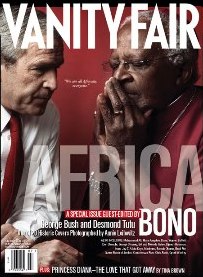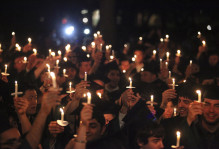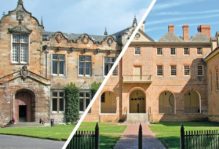Tutu Speaks
Imagine being in the university dining hall just casually eating dinner – talking, drinking hot tea, trying to decide whether you’ll take a nap before or after you read for class – when, suddenly, someone comes up to your table and says nonchalantly, “Dr. Martin Luther King, Jr. is lecturing in the library in about 10 minutes. You can go hear him speak if you want.”
What????! What!!!! ß That’s how I think most Americans would react if MLK was still alive today. This is exactly how Bianca, Jeanette, Meghan and I felt except instead of MLK, it was Archbishop Desmond Tutu who was speaking in 10 minutes. Surprisingly, the four of us didn’t immediately jump up and run toward the library. We sat there and finished our dinner. Ten minutes? We all knew there was no way we’d be able to hear him speak. After finishing up we walked over to the library and to our surprise, there were still seats left! There wasn’t even a line (apparently the event wasn’t well advertised; not even our friends from UCT knew about it). We found seats that were pretty close to the stage and just sat there unable to believe how drastically our night had changed.

Bush and Tutu
When I think of Desmond Tutu and what he did for South Africa, the closest American parallel I can think of is MLK. Both are men of immense faith and when called upon, helped lead there nation toward justice and true democracy. Both men are now international icons. After their triumphs, both called for forgiveness and racial reconciliation. We had no idea what the lecture was going to be about. We just wanted to be in the Archbishop’s presence.
We soon found out the event wasn’t a lecture, but a forum that included a four-person panel. Joining Desmond Tutu was author and journalist Heidi Holland, former UCT vice-chancellor/activist Dr. Mamphela Ramphele, and noted UCT professor Wilmot James. This was the second forum to be held as part of UCT’s Difficult Dialogues series. The panel was assembled to discuss the election crisis occurring in neighboring Zimbabwe. According to several reports, former independence leader and longtime Zimbabwean president, Robert Mugabe, had used wide-scale intimidation and violence to win the recent election (he ran unopposed after the only opposition candidate pulled out). Zimbabwe is currently in a state of unrest – the effects of which can be felt across the border in South Africa.
Having overcome extraordinary conflict themselves, the panelists called on the South African government to intervene. South Africa must be a leader in sub-saharan Africa and stand as an “extraordinary icon of reconciliation and forgiveness,” said Tutu. Ramphele believed that there could be an “African renaissance” led by South Africa, but not admidst such “impunity.” Holland, who gave a complete psycho-analysis of Mugabe based on research and an unprecedented two hour interview with the Zimbabwean president, stated that there needed to be “psycho-diplomacy” and that Zimbabwe’s former colonizer, Great Britain, needed to make amends.
Sitting there listening to this accomplished panel in a room full of South Africans and being able to understand and empathize with the issue was surreal. I’ve traveled abroad several times before, but for the first in my life I felt I was truly a “global citizen.”




No comments.
Comments are currently closed. Comments are closed on all posts older than one year, and for those in our archive.